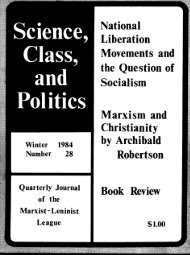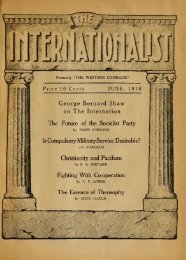Principles of social education for deaf and dumb children in Russia
Principles of social education for deaf and dumb children in Russia
Principles of social education for deaf and dumb children in Russia
Create successful ePaper yourself
Turn your PDF publications into a flip-book with our unique Google optimized e-Paper software.
J<br />
SocIAL EDUCATION FOR DEAF AND DUMB CHILDREN<br />
underst<strong>and</strong> the spoken word; it also learns to concentrate on speech, organize its life<br />
<strong>and</strong> the conduct <strong>of</strong> it; these achievements would be <strong>in</strong>accessible to a <strong>dumb</strong> child. At<br />
the early stage, from two to five years, there are no sounds to be dealt with. The<br />
exercises consist <strong>of</strong> <strong>children</strong>'s first prattl<strong>in</strong>gs which are preparatory to each new word<br />
<strong>and</strong> read<strong>in</strong>g from the lips; simultaneously with it, the organs <strong>of</strong> speech - voice,<br />
breath<strong>in</strong>g - are also work<strong>in</strong>g <strong>and</strong> develop<strong>in</strong>g <strong>in</strong> quite a natural way. These exercises<br />
are be<strong>in</strong>g practised be<strong>for</strong>e the child actually acquires correct speech. The child's<br />
speech is be<strong>in</strong>g organically developed directly from its chatter <strong>and</strong> is from the<br />
beg<strong>in</strong>n<strong>in</strong>g <strong>in</strong>telligent <strong>and</strong> adapted to its function. Ifwe were to wait until the child<br />
learned to pronounce each sound correctly, <strong>and</strong> then were to compose the sounds <strong>in</strong>to<br />
syllables, the syllables <strong>in</strong>to words - if we were to proceed from the elements <strong>of</strong> speech<br />
to synthesis - we would never hear a natural <strong>and</strong> real speech from the child. The<br />
natural method is just vice versa: from the complex to the simple elements <strong>of</strong> speech<br />
<strong>and</strong> their comb<strong>in</strong><strong>in</strong>g. Ifyou look <strong>in</strong>to the history <strong>of</strong> the development <strong>of</strong> human speech<br />
<strong>and</strong> that <strong>of</strong> a s<strong>in</strong>gle child, you will f<strong>in</strong>d that the phrase precedes the word, the word<br />
the syllable <strong>and</strong> the syllable the sound. Even a s<strong>in</strong>gle phrase is practically an abstraction.<br />
The speech is be<strong>in</strong>g made up <strong>of</strong> more than one sentence, <strong>and</strong> there<strong>for</strong>e <strong>children</strong><br />
are much quicker at learn<strong>in</strong>g an <strong>in</strong>telligent, useful, <strong>social</strong>ly necessaryspeech - by that<br />
I mean a logical speech <strong>and</strong> not an articulation. 'The consecutiveness <strong>in</strong> the development<br />
<strong>of</strong> speech <strong>of</strong> a <strong>deaf</strong><strong>and</strong> <strong>dumb</strong>', says Natalia Rau, founder <strong>of</strong> the first Children's<br />
Garden <strong>for</strong> the Deaf <strong>and</strong> Dumb <strong>in</strong> <strong>Russia</strong>, 'must be copied from that <strong>of</strong> a normal<br />
child : the stages <strong>of</strong> development <strong>of</strong> speech must be the same, the difference is only so<br />
faras means <strong>and</strong> time are concerned - a <strong>deaf</strong> <strong>and</strong> <strong>dumb</strong> child will be able to say at the<br />
age <strong>of</strong> three to four what a normal child will say at the age <strong>of</strong> one year.'<br />
- The foundation <strong>of</strong> future s h is be<strong>in</strong>g laid here dur<strong>in</strong>g the pre-school <strong>education</strong>.<br />
Speech does not only serve as a means <strong>of</strong> <strong>in</strong>tercourse between <strong>children</strong>, but also as an<br />
<strong>in</strong>strument <strong>of</strong> thought. 'Synthetic read<strong>in</strong>g from the lips', says Natalia Rau,<br />
is already the beg<strong>in</strong>n<strong>in</strong>g <strong>of</strong> th<strong>in</strong>k<strong>in</strong>g through the verbal word. When read<strong>in</strong>g from the<br />
lips <strong>and</strong> observ<strong>in</strong>g the picture <strong>of</strong> the mouth <strong>and</strong> the movements <strong>of</strong> the speech organs,<br />
the child is <strong>in</strong>timately associat<strong>in</strong>g this picture with the idea, the idea with the movement<br />
<strong>of</strong> th mouth <strong>and</strong> tongue . Let us assume, <strong>for</strong> <strong>in</strong>stance, that the child is already<br />
familiar with the sentence 'Come here', when it has to go itself or call somebody else <br />
it sees mentally the utter<strong>in</strong>g <strong>of</strong> the sentence <strong>in</strong> itself, <strong>and</strong> the muscles <strong>of</strong> the speech<br />
organs which are <strong>in</strong>strumental <strong>in</strong> the produc<strong>in</strong>g <strong>of</strong> this sentence become <strong>in</strong>voluntarily<br />
stra<strong>in</strong>ed . Gradually, <strong>in</strong> proportion as the frequent read<strong>in</strong>g from the lips is be<strong>in</strong>g<br />
practised, rh child's ideas <strong>and</strong> <strong>in</strong>ner mental utter<strong>in</strong>g are also becom<strong>in</strong>g strengthened,<br />
<strong>and</strong> though not able to pronounce verbally, the child already speaks mentally; the result<br />
there<strong>of</strong> is that the mo t precious th<strong>in</strong>g <strong>in</strong> our work with the pre-school child is be<strong>in</strong>g<br />
<strong>for</strong>med, viz. the habit <strong>of</strong> underst<strong>and</strong><strong>in</strong>g, th<strong>in</strong>k<strong>in</strong>g <strong>and</strong> express<strong>in</strong>g its thoughts verbally.<br />
Thus real speech st<strong>and</strong>s our <strong>in</strong> all its variery <strong>of</strong> functions; it becomes organically part<br />
<strong>of</strong> the child's life <strong>and</strong> beg<strong>in</strong>s to shape its life <strong>and</strong> conduct around the centre <strong>of</strong> its<br />
<strong>social</strong> experience, <strong>of</strong> which the chie<strong>for</strong>gan is speech. There<strong>for</strong>e, Natalia Rau is quite<br />
21
26 LEV VYGOTSKY<br />
<strong>of</strong> Education <strong>of</strong><strong>children</strong> with defects, under the People 's Commissariat <strong>of</strong> Education, <strong>Russia</strong>n<br />
Socialist Federative Soviet Republic, <strong>and</strong> Lecturer <strong>of</strong> the Second Moscow State University. Th e<br />
presentation at the conference <strong>in</strong> London took place <strong>in</strong>jun 1925 as part <strong>of</strong> the only trip abroad<br />
Vygorsky ever undertook. It seems he travelled by tra<strong>in</strong> <strong>and</strong> boat <strong>and</strong> paid visits to research<br />
centres <strong>in</strong> Germany, Holl<strong>and</strong> <strong>and</strong> France. No details <strong>of</strong> th is trip have so far been unearthed <strong>and</strong><br />
one can only guess that he visited Gestalt colleagues <strong>in</strong> Berl<strong>in</strong> <strong>and</strong> defecrologises/educarionalists<br />
<strong>in</strong> Amsterdam <strong>and</strong> Paris.<br />
A slightly longer <strong>Russia</strong>n version <strong>of</strong> the same paper has been published <strong>in</strong> vol. 5 <strong>of</strong><br />
Vygotsky's Collected Works. See Vygotsky, L. S. 1983: Pr<strong>in</strong>cipy <strong>social</strong>'nogo vospitanija<br />
glukhonemykh detej. In L. S. Vygorsky Solwanie Srxhi ij. T< 5. Os OVJ tkfJuologii (pp. 101<br />
14). Moscow: Pedagogika, Some <strong>of</strong> the biographical <strong>and</strong> bibliographical <strong>in</strong><strong>for</strong>mation provided<br />
<strong>in</strong> notes 1 to 4 is based on the notes to this edition.<br />
Rau, Natalia Aleks<strong>and</strong>rovna (1870-1947), <strong>Russia</strong>n expert <strong>in</strong> th <strong>education</strong> <strong>of</strong> th <strong>deaf</strong>.<br />
Vygotsky refers to p. 59 <strong>of</strong>Rau, N . A. 1926: Doshkol'noe vospitanie glukhonemykh [Preschool<br />
<strong>education</strong> <strong>of</strong> <strong>deaf</strong><strong>and</strong> <strong>dumb</strong> <strong>children</strong>]. In S. S. Tizanova <strong>and</strong> P. P. Pochap<strong>in</strong>a (eds),<br />
Puti 'VOSpitanija fizuheski tkjektivnogo rdJenka [Ways <strong>of</strong>Educat<strong>in</strong>g thePhysically DeftctitltChild].<br />
Moscow. Apparently, Vygotsky saw some unpublished version <strong>of</strong> th is book as his talk w<br />
held one year be<strong>for</strong>e its publication.<br />
2 Malisch , Konstant<strong>in</strong> (1860-1925), Austrian specialist <strong>in</strong> the <strong>education</strong> <strong>of</strong> <strong>deaf</strong> <strong>children</strong>.<br />
Vygorsky's quotes are taken from p. 81 <strong>of</strong> Kulpe, G . I. 1926: Metod celykh slov i fraz<br />
Malisha [Malisch's method <strong>of</strong> whole words <strong>and</strong> phrases] . In S. S. Tizanova <strong>and</strong> P. P.<br />
Pochap<strong>in</strong>a (eds), Puti 'VOSpitanija fizuheski tkfektivnogo rdJenka. Moscow.<br />
3 Sokoliansky, Ivan Afanas'evich (1889-1960), <strong>Russia</strong>n expen <strong>in</strong> the <strong>education</strong> <strong>of</strong> <strong>deaf</strong> <strong>and</strong><br />
bl<strong>in</strong>d <strong>children</strong>. Started his first <strong>education</strong>al experiments with group <strong>of</strong> pupils <strong>in</strong> Kharkov<br />
<strong>in</strong> 1923. Was soon generally regarded as the founder <strong>of</strong> a new system <strong>of</strong> <strong>education</strong> <strong>for</strong> <strong>deaf</strong>,<br />
<strong>dumb</strong> <strong>and</strong> bl<strong>in</strong>d <strong>children</strong>. His most successful pupil Ol 'ga Ivanovna Skorodokhodova<br />
as well known <strong>in</strong> the Soviet Union as Helen Keller <strong>in</strong> the Western world . His work was<br />
cont<strong>in</strong>ued by his student A. I. Meshcherjakov. Vygotsky's description <strong>of</strong> Sokoliansky's<br />
method is based on pp. 74-5 <strong>of</strong> Korel 'nikov, M. N . 1926: Na novom puti: (chtenie s gub<br />
kak osnova obuchenija glukhonernykh ustnoj rechi) [On a new path: (lip read<strong>in</strong>g as the<br />
basis <strong>of</strong> teach<strong>in</strong>g <strong>deaf</strong><strong>and</strong> <strong>dumb</strong> vocal speech)] . In S. S. Tizanova <strong>and</strong> P. P. Pochap<strong>in</strong>a (eds),<br />
Puti tIOspitanija fizuheski tkfektitmogo rdJenka. Mosco .<br />
4 This may have been the German school re<strong>for</strong>mer Georg Kerschensre<strong>in</strong>er (1854-1932),<br />
whose ideas were very well known by th Soviet theorists <strong>of</strong> the labour school - such as<br />
P. P. Blonsky - <strong>and</strong> greatly <strong>in</strong>spired them, but whose name was not very popular as he was<br />
considered to hold bourgeois <strong>and</strong> authoritarian views.<br />
5 Krupskaja, N . K. (1869-1939), wife <strong>of</strong> Len<strong>in</strong>. Took great <strong>in</strong>terest <strong>in</strong> <strong>education</strong>al matters<br />
<strong>and</strong> was active <strong>in</strong> the People 's Commissariat <strong>of</strong> Education. Published papers <strong>and</strong> pamphlets<br />
discuss<strong>in</strong>g school re<strong>for</strong>m <strong>and</strong> boy scouts. See, <strong>for</strong> <strong>in</strong>stance, Krupskaja, N . K. 1925:<br />
Vospitanie molodozhi II Len<strong>in</strong>skom dukht [Education <strong>of</strong> the Youth <strong>in</strong> Len<strong>in</strong>'s Spirit]. Moscow:<br />
Molodaja Gvardia. The present quote can be found on p. 214 <strong>of</strong> Ktupskaja, N . K. 1978:<br />
Sistema narodnogo obrazovanija v RSFSR. In N. K. Krupskaja, Pedagogicheskie Srxh<strong>in</strong>mija.<br />
Tom 2. Moscow.<br />
6 Vygotsky's paper was followed by four rabies which gave an overview <strong>of</strong>the number <strong>of</strong> <strong>deaf</strong><br />
<strong>and</strong> <strong>dumb</strong> people <strong>in</strong> <strong>Russia</strong> <strong>and</strong> the Ukra<strong>in</strong>e, th <strong>in</strong>stitutes tak<strong>in</strong>g care <strong>of</strong> th m, the trad<br />
the <strong>children</strong> were taught, etc.

















